भीष्म अवार्ड से सम्मानित – राजस्थान के जगदीश गुर्जर
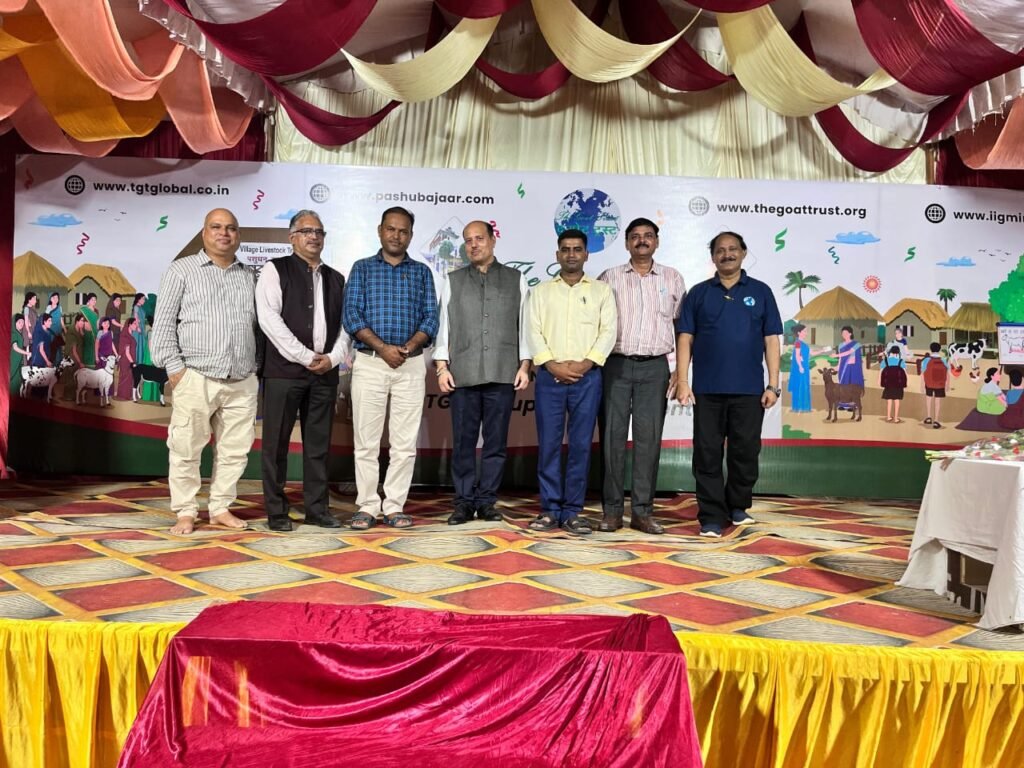
TGT Group of Organization द्वारा आयोजित प्रतिष्ठित भीष्म अवार्ड समारोह में राजस्थान से केवल जगदीश गुर्जर को सम्मानित किया गया। यह सम्मान उन्हें लघु पशुधन कार्यक्रम (Small Livestock Program) में उत्कृष्ट कार्य के लिए प्रदान किया गया है। यह अवार्ड 29 सितंबर को लखनऊ में आयोजित भव्य समारोह में दिया गया, जिसमें छोटे पशुधन जैसे बकरी पालन और उससे जुड़े सतत् विकास कार्यों को बढ़ावा देने वाले योगदानों को विशेष रूप से सम्मानित किया गया। इस अवसर पर The Goat Trust के निदेशक श्री संजीव कुमार, केंद्रीय बकरी अनुसंधान संस्थान के निदेशक, The Goat Trust के श्री भीष्म सिंह, उज्ज्वल सरकार, तथा सेवा संस्थान तमिलनाडु के निदेशक जैसे प्रमुख व्यक्तित्व उपस्थित रहे। इनके कर कमलों से यह सम्मान जगदीश गुर्जर को प्रदान किया गया। जगदीश गुर्जर का योगदान लघु पशुधन कार्यक्रम ग्रामीण आजीविका और सतत विकास की दिशा में एक महत्वपूर्ण पहल है। जगदीश गुर्जर ने इस क्षेत्र में नवीन कार्यप्रणालियों और सामुदायिक भागीदारी के माध्यम से उल्लेखनीय योगदान दिया है। उनके प्रयासों ने न केवल पशुपालकों की आय बढ़ाने में मदद की है, बल्कि ग्रामीण समुदाय में आत्मनिर्भरता की भावना को भी मजबूत किया है। निष्कर्ष यह सम्मान राजस्थान और देशभर के उन सभी लोगों के लिए प्रेरणा है जो लघु पशुधन और सतत आजीविका विकास के क्षेत्र में कार्यरत हैं। जगदीश गुर्जर का यह अवार्ड बताता है कि यदि लगन और समर्पण के साथ काम किया जाए तो छोटे स्तर पर किए गए प्रयास भी बड़े बदलाव ला सकते हैं।
केंद्रीय बकरी अनुसंधान संस्थान और Eco Livelihood Creations Pvt. Ltd. के बीच 5-वर्षीय साझेदारी – ग्रामीण आजीविका के लिए नई दिशा
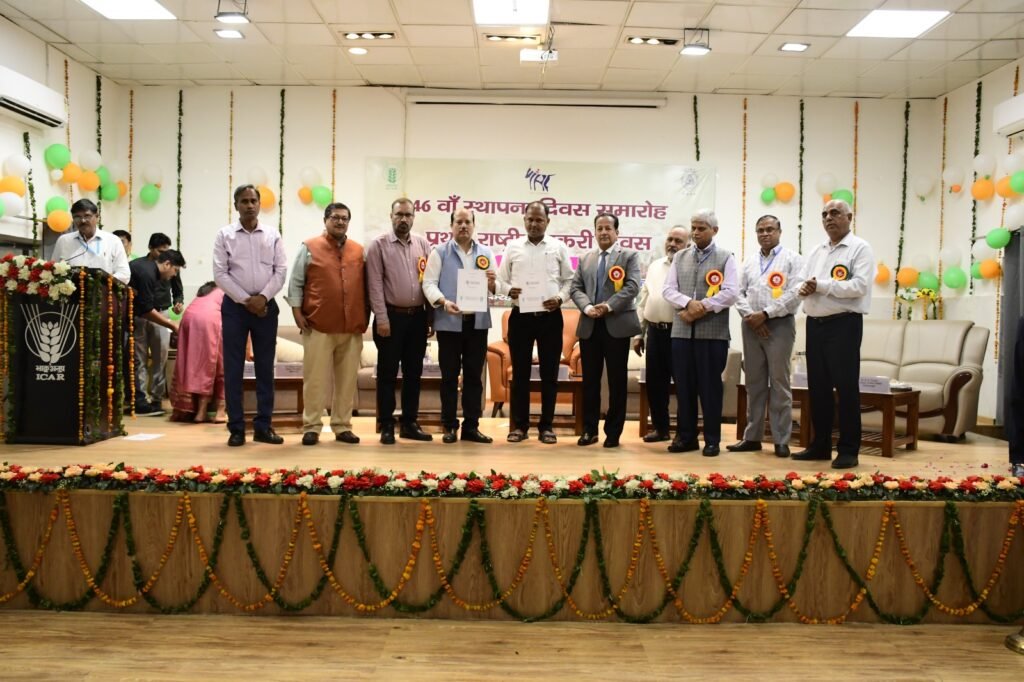
केंद्रीय बकरी अनुसंधान संस्थान और Eco Livelihood Creations Pvt. Ltd. के बीच 5-वर्षीय समझौता : राजस्थान में बकरी पालन और ग्रामीण आजीविका के क्षेत्र में एक नई पहल 12 जुलाई 2025 को, भारतीय कृषि अनुसंधान परिषद (ICAR), भारत सरकार के अधीन केंद्रीय बकरी अनुसंधान संस्थान, मखदूम (मथुरा, उत्तर प्रदेश) के 46वें स्थापना दिवस के पावन अवसर पर, Eco Livelihood Creations Pvt. Ltd. के साथ एक महत्वपूर्ण 5-वर्षीय समझौता ज्ञापन (MoU) पर हस्ताक्षर किए गए। यह समझौता संस्थान की ग्रामीण विकास की दिशा में प्रतिबद्धता और बकरी पालन को आत्मनिर्भरता का साधन बनाने की दूरदर्शिता को दर्शाता है। इस ऐतिहासिक अवसर पर संस्थान के माननीय निदेशक महोदय की गरिमामयी उपस्थिति में इस साझेदारी को औपचारिक रूप प्रदान किया गया। यह समझौता न केवल एक संस्थागत सहयोग है, बल्कि ग्रामीण भारत में नवाचार, प्रशिक्षण, और सतत आजीविका के एक नए युग की शुरुआत है। साझेदारी का उद्देश्य और दृष्टिकोण भारत की ग्रामीण अर्थव्यवस्था में बकरी पालन एक महत्वपूर्ण भूमिका निभाता है, विशेषकर राजस्थान जैसे राज्यों में जहाँ यह हजारों परिवारों की आजीविका का आधार है। इस साझेदारी का मुख्य उद्देश्य राजस्थान में वैज्ञानिक बकरी पालन को बढ़ावा देना, स्थानीय किसानों और पशुपालकों को प्रशिक्षित करना, तथा आधुनिक तकनीकों और बाजार से जोड़ने की व्यवस्था करना है। Eco Livelihood Creations Pvt. Ltd. और संस्थान के बीच यह समझौता एक मॉडल परियोजना के रूप में कार्य करेगा, जहाँ संयुक्त अनुसंधान, फील्ड स्तर पर प्रशिक्षण, उद्यमिता विकास, और महिलाओं व युवाओं को सशक्त करने की दिशा में काम किया जाएगा। मुख्य कार्यक्षेत्र और गतिविधियाँ इस समझौते के अंतर्गत निम्नलिखित प्रमुख गतिविधियाँ प्रस्तावित हैं: राजस्थान में बकरी पालन की संभावनाएँ राजस्थान राज्य अपने भौगोलिक और जलवायु स्वरूप के कारण बकरी पालन के लिए अत्यंत उपयुक्त है। यहाँ की स्थानीय नस्लें जैसे सिरोही, जैसलमेरी, मारवाड़ी आदि न केवल जलवायु सहनशील हैं, बल्कि दूध और मांस उत्पादन में भी श्रेष्ठ हैं। फिर भी, सही प्रशिक्षण, तकनीकी मार्गदर्शन और बाजार सुविधा के अभाव में कई किसान अपनी संभावनाओं का पूर्ण दोहन नहीं कर पाते। इस साझेदारी के माध्यम से, Eco Livelihood और संस्थान मिलकर राजस्थान को एक मॉडल स्टेट के रूप में विकसित करेंगे जहाँ बकरी पालन को आजीविका का एक स्थायी और लाभकारी साधन बनाया जाएगा। महिला सशक्तिकरण और SHGs का समावेश महिलाएं ग्रामीण आजीविका का मूल आधार होती हैं। इस MoU के अंतर्गत विशेष जोर महिला स्व-सहायता समूहों (SHGs) पर दिया जाएगा। उन्हें न केवल बकरी पालन में प्रशिक्षित किया जाएगा, बल्कि लघु उद्योग, दुग्ध उत्पादन, बकरी से बने उत्पादों का मूल्यवर्धन, और स्थानीय स्तर पर विपणन में भी सक्षम किया जाएगा। इससे न केवल महिलाएं आर्थिक रूप से आत्मनिर्भर होंगी, बल्कि परिवार और समाज में उनका निर्णयात्मक योगदान भी बढ़ेगा। प्रभाव और संभावित परिणाम इस समझौते के प्रभाव निम्नलिखित क्षेत्रों में देखने को मिलेंगे: संस्थान की भूमिका केंद्रीय बकरी अनुसंधान संस्थान, मखदूम, देश का प्रमुख अनुसंधान संस्थान है जो बकरी पालन के क्षेत्र में वैज्ञानिक अनुसंधान, प्रशिक्षण और नवाचार के लिए विख्यात है। संस्थान की विशेषज्ञता, अत्याधुनिक प्रयोगशालाएं, वैज्ञानिकों की टीम और तकनीकी जानकारी इस साझेदारी की रीढ़ साबित होंगी। Eco Livelihood Creations Pvt. Ltd. की प्रतिबद्धता Eco Livelihood Creations Pvt. Ltd. एक अग्रणी सामाजिक उद्यम है जो ग्रामीण भारत में आजीविका निर्माण, प्राकृतिक संसाधनों की स्थिरता और महिला सशक्तिकरण के लिए कार्यरत है। कंपनी की टीम इस MoU के माध्यम से राजस्थान में सैकड़ों गांवों में परिवर्तन लाने के लिए पूर्ण रूप से प्रतिबद्ध है। भविष्य की योजनाएँ यह साझेदारी आने वाले वर्षों में निम्नलिखित लक्ष्यों को प्राप्त करने की दिशा में कार्य करेगी: निष्कर्ष यह 5-वर्षीय समझौता ज्ञापन केवल एक दस्तावेज़ नहीं, बल्कि गांव, गरीब और गाय आधारित आत्मनिर्भर भारत की परिकल्पना की दिशा में एक ठोस कदम है। जब विज्ञान, समाज और सेवा एकजुट होकर कार्य करते हैं, तो परिवर्तन केवल संभव ही नहीं बल्कि अवश्यंभावी होता है। Eco Livelihood Creations Pvt. Ltd. और केंद्रीय बकरी अनुसंधान संस्थान की यह साझेदारी आने वाले समय में लाखों ग्रामीण परिवारों के जीवन को सकारात्मक रूप से प्रभावित करेगी और स्थायी ग्रामीण विकास का एक प्रेरणादायक मॉडल प्रस्तुत करेगी।
Goat Farming in Rural India – Opportunity, Training, and Empowerment
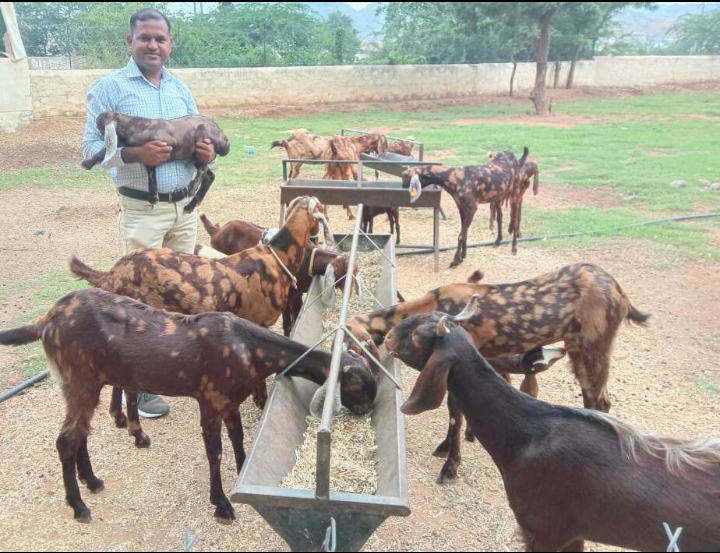
Goat farming has long been a part of India’s agrarian landscape, especially in semi-arid, hilly, and tribal regions. Often described as the “poor man’s cow,” goats have proven to be a reliable source of income, nutrition, and security for millions of smallholder farmers. In recent years, however, with growing awareness, market demand, and technical interventions, goat rearing has evolved into a structured livelihood opportunity. At EcoLivelihood Creations, goat farming is not treated as a side activity—it is a centerpiece of rural economic resilience, especially for landless families and women-led households. This blog explores why goat farming is relevant, what it takes to succeed, and how structured support systems are making all the difference. Why Goat Farming? Goats are hardy animals that can survive on minimal feed, adapt to various climates, and reproduce quickly. They require less investment than cattle, are easier to manage, and yield valuable outputs including milk, meat, manure, and even skin for leather products. Key benefits include: In India, goat meat (chevon) is widely preferred across communities, and goat milk is increasingly being recognized for its digestibility and health benefits. EcoLivelihood’s Approach to Goat Rearing EcoLivelihood Creations supports goat farming as a full-fledged enterprise. Our programs address everything from breed selection to health management, housing, feed, and even marketing. Importantly, our model is women-inclusive, where the goat becomes a key economic asset in female-headed or low-income households. Here are some key pillars of our goat-based interventions: 1. Breed Selection and Upgrading Local breeds like Sirohi, Jamunapari, and Barbari are identified based on regional adaptability and purpose (milk or meat). We provide technical guidance on breed purity, selection, and even inter-village exchange to prevent inbreeding. 2. Goat Housing and Shed Construction Proper shelter is essential to protect goats from heat, rain, and disease. We train families to construct low-cost sheds using local material. The design includes elevated flooring, good ventilation, and separate spaces for young kids (छिका). 3. Fodder and Nutrition Management Green fodder, dry feed, and mineral mixtures are essential for goat health and milk yield. Farmers are trained in developing mobile feeding systems, avoiding contamination, and preparing home-based feed mixes when resources are limited. 4. Health Management and Vaccination One of the most crucial aspects is ensuring preventive healthcare. We organize: 5. Training and Handholding Our field facilitators conduct structured training sessions that include: 6. Marketing and Value Addition In addition to selling live goats or meat, we encourage:
Empowering Communities Through Action – Inside Our Livelihood Projects
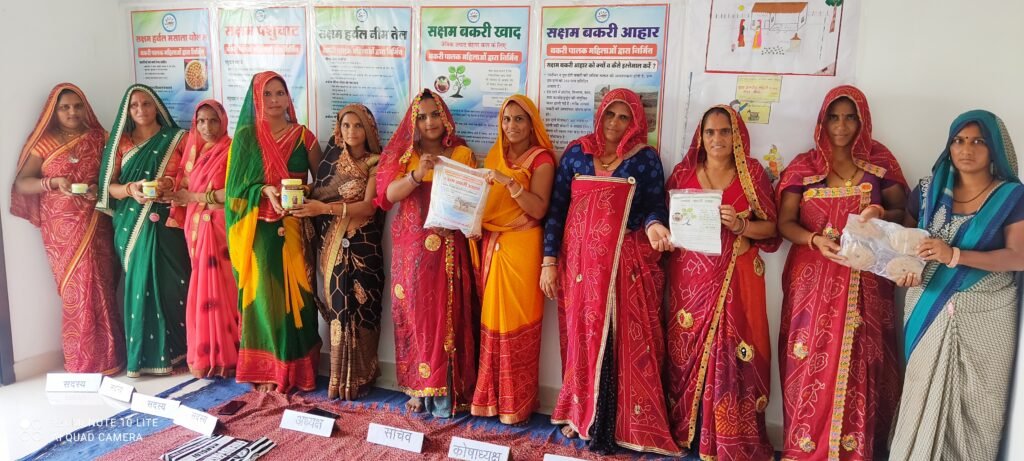
EcoLivelihood Creations Private Limited is not just an idea—it is a working model of inclusive, field-based development. At the center of its approach is a series of ongoing projects that directly address the needs of rural communities, particularly in Rajasthan, with a strong emphasis on dairy, goat rearing, training, and microenterprise development. These projects are not only transforming livelihoods but also rebuilding confidence among the most underserved populations. This blog offers an inside look at the nature, scope, and impact of some of EcoLivelihood’s key initiatives currently underway. Project 1: Dairy and Goat-Based Livelihood Development Location: Nasirabad & Masuda Blocks, Ajmer DistrictDuration: 2023–2026Primary Beneficiaries: Smallholder farmers, landless families, rural women This flagship project focuses on improving the livelihoods of rural households through scientific livestock management and value-based dairy practices. It incorporates both cattle and goat rearing as core components. Key Interventions: The project has already helped over 300 households increase their monthly income from livestock and dairy. In addition to economic gains, the program has improved animal health, reduced mortality rates, and enhanced access to veterinary care through community-based workers. Project 2: Millet and Spice Processing Cluster Location: Ajmer District (Rural Clusters)Duration: 2024–2027Partners: Local SHGs, Farmer Producer Organizations (FPOs) This project aims to add value to indigenous crops like millets and spices while creating rural employment through microenterprise models. Given Rajasthan’s traditional crop patterns, this initiative taps into the potential of bajra, ragi, kodo, and locally grown spices like coriander, turmeric, and red chili. Key Components: The project primarily engages rural women, enabling them to operate from home or in small clusters. With low capital input and high demand, the model is highly replicable and income-friendly. Project 3: Eco Pathshala – Environmental Education in Rural Schools Location: Government schools across Masuda and NasirabadTarget Group: School children (age 6–14), Teachers, ParentsStatus: Ongoing Eco Pathshala is an innovative, school-based program to instill environmental awareness among children and introduce practical solutions like composting, kitchen gardening, and waste segregation at the grassroots level. Focus Areas: More than just an educational initiative, Eco Pathshala fosters a culture of sustainability that begins in childhood and spreads into families and the wider village ecosystem. Project 4: Women’s Livelihood Collectives and SHG Strengthening Coverage: Across all project locationsFocus: Enterprise, training, credit access, and leadership Women are central to EcoLivelihood’s approach. This cross-cutting project aims to form, train, and strengthen women’s self-help groups (SHGs) and producer collectives, ensuring they function effectively and take the lead in income generation activities. Highlights: So far, over 600 women have been trained across multiple themes, and many now lead their own microenterprises. Their participation has also resulted in increased school enrollment for children and better household nutrition. Project 5: Community-Based Fodder and Feed Security Problem Addressed: Seasonal fodder scarcity and poor animal nutritionInterventions: This project strengthens the livestock value chain by ensuring animals are well-nourished year-round, leading to better milk yields, reduced disease, and overall economic security. Impact Overview Across all current projects, EcoLivelihood Creations has demonstrated that development is most effective when it is local, participatory, and skill-based. Cumulative Project Outcomes to Date: These numbers reflect a steady and scalable model of rural transformation where knowledge, infrastructure, and support come together to create real impact. What Makes Our Projects Unique Looking Forward EcoLivelihood Creations continues to build partnerships with local governments, development agencies, and corporate social responsibility (CSR) wings to scale these initiatives. The goal is to replicate successful models across districts, enabling thousands more to access dignified livelihoods. Future directions include: Conclusion Projects don’t change lives—people do. But when those people are supported by structured, need-based, and skill-enhancing programs, transformation becomes possible. At EcoLivelihood Creations, every project is a step toward a more equitable, capable, and self-reliant rural India. Through training, resources, and a people-first philosophy, we continue to walk alongside communities in their journey toward sustainable development.
Transforming Rural Lives – The Story of EcoLivelihood Creations
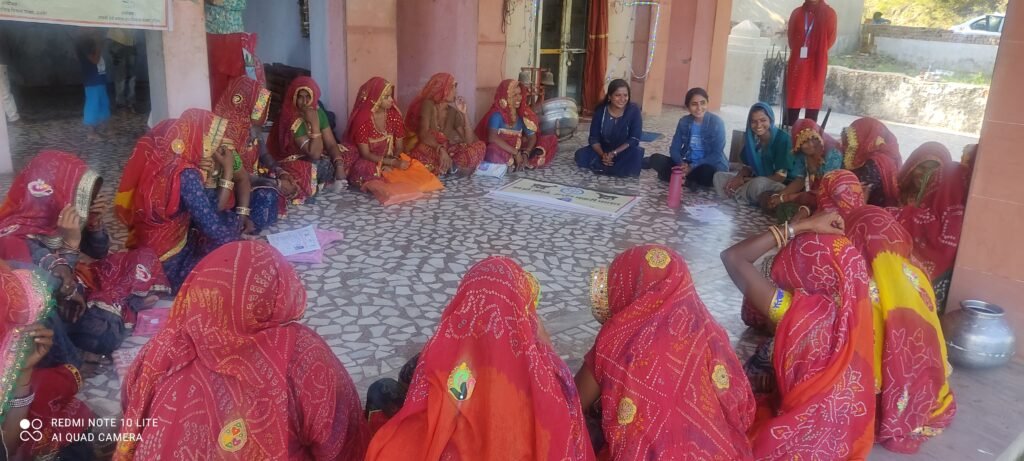
In the heartlands of India, where agriculture is not just a profession but a way of life, EcoLivelihood Creations Private Limited has emerged as a catalyst for rural transformation. Established with a vision to empower farmers, women, and youth through sustainable and skill-based livelihood models, the organization is redefining how development reaches the grassroots. Our Beginning: Vision Rooted in Empowerment EcoLivelihood Creations was born from a deep understanding of rural challenges—unemployment, underutilized resources, poor access to markets, and lack of technical support. Rather than offering temporary relief, the company chose a long-term path of capacity building. Our mission is simple yet powerful: enable rural communities to become self-sufficient through training, technology, and sustainable enterprise. Based in Nasirabad, Ajmer (Rajasthan), we focus on areas where opportunities are often scarce but potential is immense. Our roots lie in fieldwork, and our strength is our proximity to the people we serve. What We Do: Multi-Faceted Livelihood Development EcoLivelihood Creations operates across several key domains, each designed to address a core rural need. 1. Dairy Farming & Livestock Development We train farmers in modern dairy practices—from proper cattle nutrition and housing to hygienic milk production and marketing. Goat rearing is another major focus, especially for landless and smallholder farmers. We support every step: breed selection, deworming, vaccination, and even product diversification like goat milk soap. 2. Skill Development & Vocational Training Whether it’s training a group of women in tailoring and spice processing or teaching young men to repair farm machinery, our skill-building programs are tailored to rural realities. We also provide modules on financial literacy, group management, and enterprise setup. 3. Agri-Based Micro Enterprises We help set up micro-enterprises around locally available resources—organic compost, millets, spices, goat milk, etc. The aim is to not only produce but also add value, package smartly, and access new markets through digital and offline channels. 4. Eco-Education & Kitchen Gardens Through our “Eco Pathshala” initiative, we introduce schoolchildren and families to the importance of biodiversity, waste management, and growing their own food. Simple practices like composting and organic gardening can bring powerful awareness and self-sufficiency. Women at the Center of Change EcoLivelihood is proudly women-centric. In many of our working areas, women were once confined to unpaid household labor. Today, many of them lead self-help groups (SHGs), run goat farms, sell dairy products, and speak with pride of their income. Our programs are designed to uplift women with: This inclusion isn’t just economic—it’s social transformation. Partnerships That Drive Impact We collaborate with foundations, local governments, farmer producer organizations (FPOs), and banks to build comprehensive support systems. Our work aligns with national goals like: Through partners like the OAK Foundation and participation in integrated livestock development projects, we ensure technical robustness and scale in everything we do. Our Reach and Impact Over the last few years, EcoLivelihood has: But numbers only tell part of the story. The real success lies in self-confidence, improved nutrition, increased school attendance (through household income), and restored dignity among rural families. Our Path Ahead We believe rural livelihoods need more than charity—they need ecosystem thinking, innovation, and trust. In the coming years, EcoLivelihood Creations aims to: Final Word Development is not just about roads and electricity—it is about agency, inclusion, and hope. At EcoLivelihood Creations, we are proud to walk this path with our rural partners. We don’t just deliver training; we build trust. We don’t just speak of sustainability; we grow it—one goat, one dairy shed, one garden at a time. Join us in our mission to create livelihoods that last, with dignity that uplifts.

